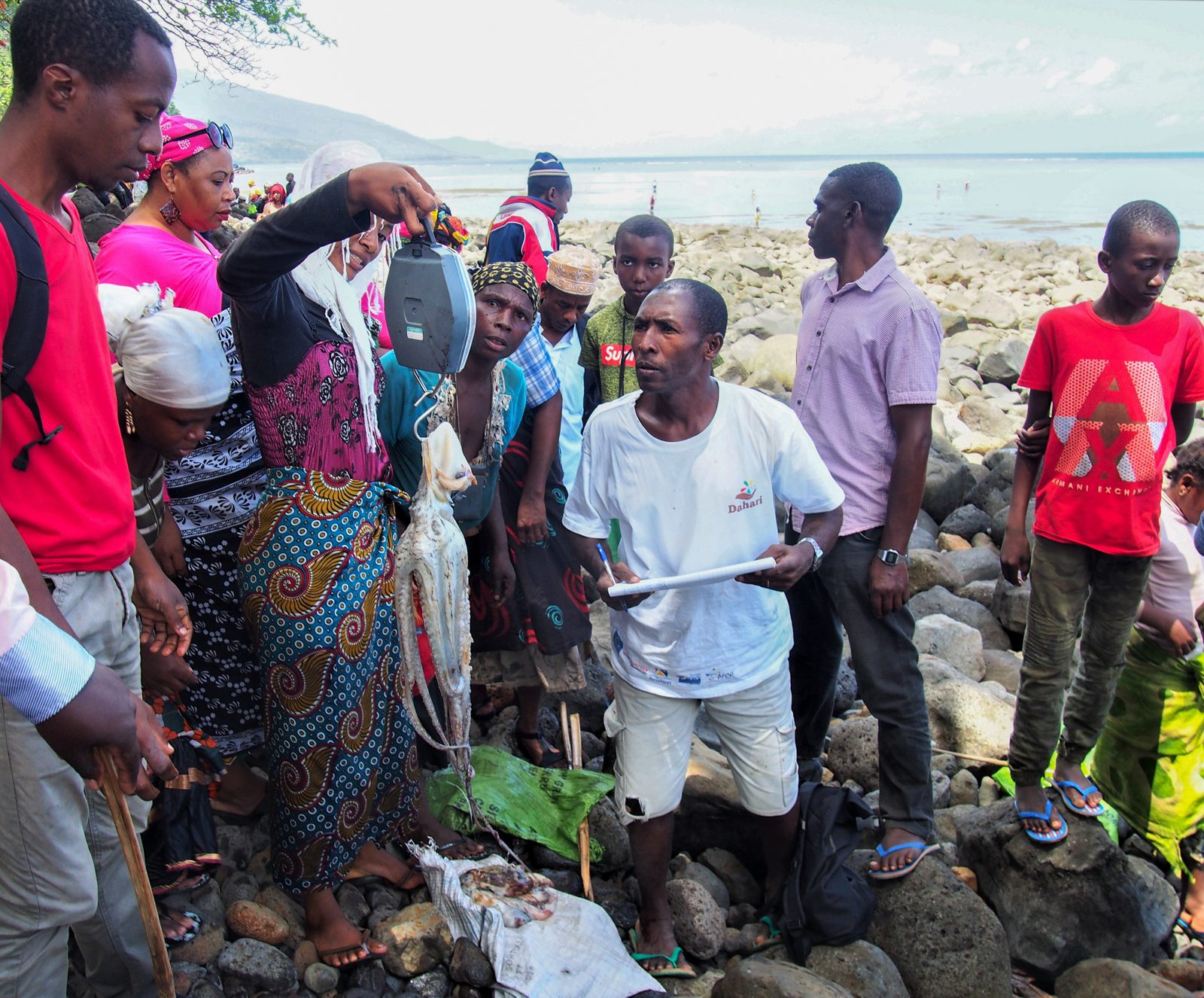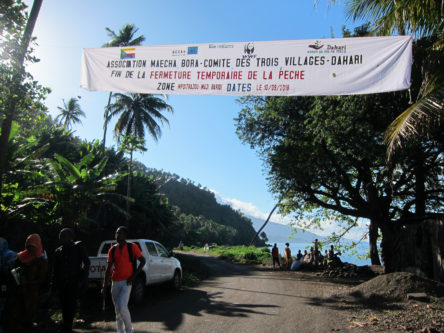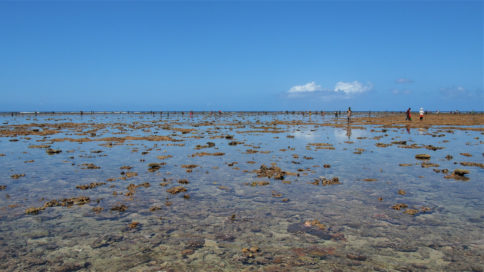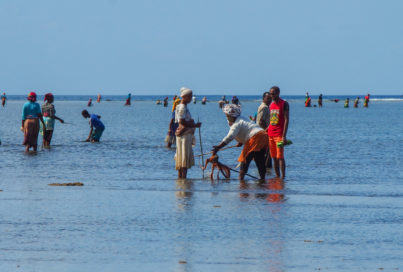A chorus at dawn
The beat of hand drums and tambourines and the chorus of women’s voices rose amidst a riot of colours, patterns, glittering dresses and veils. Above the crowd a large printed sheet glowed, lit by the morning sun, reminding the gathering crowd that they were there to celebrate the ‘fin de la fermeture temporaire de la pêche’ – the end of the temporary fishing closure. The tari, a traditional Comorian song, was being performed, but with new lyrics to mark the occasion! In step with the rhythm of the song, people moved past the singers, filming them and chatting excitedly. Amidst the buzz, the words of the singers reminded everyone that protecting their resources in the sea was an investment for, and a commitment to, future generations of Comorians.
This was the first closure of an octopus fishery in this region of the Comoros. On the southwest peninsula of Anjouan island, the villages of Vassy, Dzindri and Salamani closed a 100-hectare area of reef flat for four months, prohibiting all fishing there.
For over a decade, Blue Ventures has been supporting communities across the Western Indian Ocean to organise temporary octopus fishery closures as a pathway to longer term management. Closures serve to give the octopus time to increase in size and reproduce. This management method is successful because the life cycle of octopus is short – they typically only live for 15-18 months – and they grow very quickly during the first 6 months. At the end of a temporary fishery closure, the octopus fishers should be rewarded with the financial benefits of catching more and larger octopus.
The closure on Anjouan was spearheaded by Maecha Bora, a women’s association which includes members from all three villages, and supported by Malezi Mema, the local boatfishers’ association. They were inspired to set up their own closure after taking part in a community exchange visit to Blue Ventures’ partner Mwambao in Zanzibar.
Following that visit, and in collaboration with local partner organisation Dahari and Blue Ventures, the Maecha Bora members shared with the Anjouan communities and leaders the potential value of a fishery closure, and their enthusiasm for the idea.
Out on the reef
The sun was almost fully up when hundreds of fishers started to move onto the reef flat. Everyone was on edge, wondering what might have changed since the area was closed, and whether their catches today would be everything they were hoping for. I watched nervously as the fishers climbed down the rocky scree to reach the beach and onto the reef flats, then hurried down to join them.
Out on the reef flats, a lively scene was afoot. To my left and right, fishers had octopus dangling from the tips of their spears. ‘We had no trouble finding octopus today’, Nourdine Houmadi, president of Malezi Mema, said to me. ‘Some were not even in holes in the reef, they were right there at our feet. We were almost stepping on them!’.
I myself saw the biggest octopus I had ever seen in the area, including one weighing 7 kg! On average, octopus were two times larger than usual, and each fisher caught about 5 kg of octopus on the opening day, compared to the average catch of of 1.9 kg per fisher, per day, before the closure.
Knowledge is power
I worked with Dahari technicians and Maecha Bora members before, during and after the closure to monitor the weight and number of octopus that fishers were catching. This information was key in allowing us to understand what effect the four-month-long closure had had on the local octopus population, and what, if any, benefits the closure would bring to those who rely on catching octopus as a part of their livelihood. As the old adage goes, knowledge is power, and having clear information about the catch levels in the octopus fishery, both before and after closures, empowers local people to manage their resources effectively and adaptively.

Dahari technicians monitoring octopus catch on opening day | Photo: Dahari
Not long after this successful opening, Maecha Bora members presented the results of their monitoring activities from before and after the closure, to the three communities that had been involved. Their results show the positive effects of the closure on the size and number of octopus each fisher was able to catch. After each presentation, excited discussions filled the room. People who had initially resisted the closure were now passionately encouraging others to share their vision of collective management of marine resources.
I saw more octopus, and bigger octopus, than I have seen in many years. Not since my childhood have I seen it like that!”, said Anthoumane Boura, the village chief in Salamani.
When Dahari and I suggested a second closure to the communities, many of them agreed enthusiastically! This next closure will most likely take place in the first half of of 2019, but we still have some work ahead to share the positive results of the first closure, and a longer-term vision of community-led management, more broadly amongst the Anjouan communities.
Hoping for a better life
In the lead-up to the opening, some members of Maecha Bora had shared with me their hopes, not just for this fishery closure but for the longer term – for them, their families and their communities. Mounia Sou said “I really hope that the opening will be a success, to satisfy our families’ needs and move the work of our association forward”. Maecha Bora means ‘a better life’ in Comorian, and this is clearly what the association’s members are working towards. The results on the day the fishery was opened and the mood throughout the community confirmed that Mounia’s hope had been realised.

Maecha Bora members with Blue Ventures’ Effy Vessaz (left) | Photo: Tori Jeffers
Fishery closures give community members the opportunity to see for themselves how a simple action can benefit the wider community, and that the responsible management of their own resources is within their reach. The next step for Blue Ventures and Dahari is to build on this energy and enthusiasm by supporting the Anjouan communities to implement longer-term management measures, such as sustainable fishing techniques, no-take zones, and eventually locally managed marine areas. Temporary fishery closures are a first step along the path to coastal communities taking action for improved livelihoods and wellbeing, and indeed to ‘maecha bora ya ouvoimoja’ – a better life together.
Read our previous blog from Comoros: Inspiring change: Comorian fisherwomen visit Zanzibar to learn about resource management
Cover photo: Matthew Judge
Blue Ventures’ work in the Comoros is funded by the Critical Ecosystem Partnership Fund (CEPF), a joint initiative of l’Agence Française de Développement, Conservation International, the European Union, the Global Environment Facility, the Government of Japan, the MacArthur Foundation and the World Bank. We would also like to thank the World Wildlife Fund, Tusk Trust and the European Development Fund for their support.





